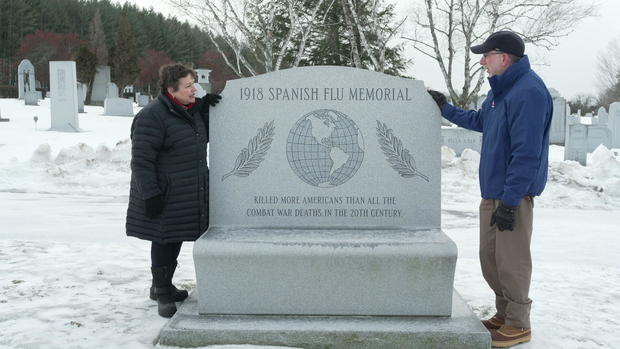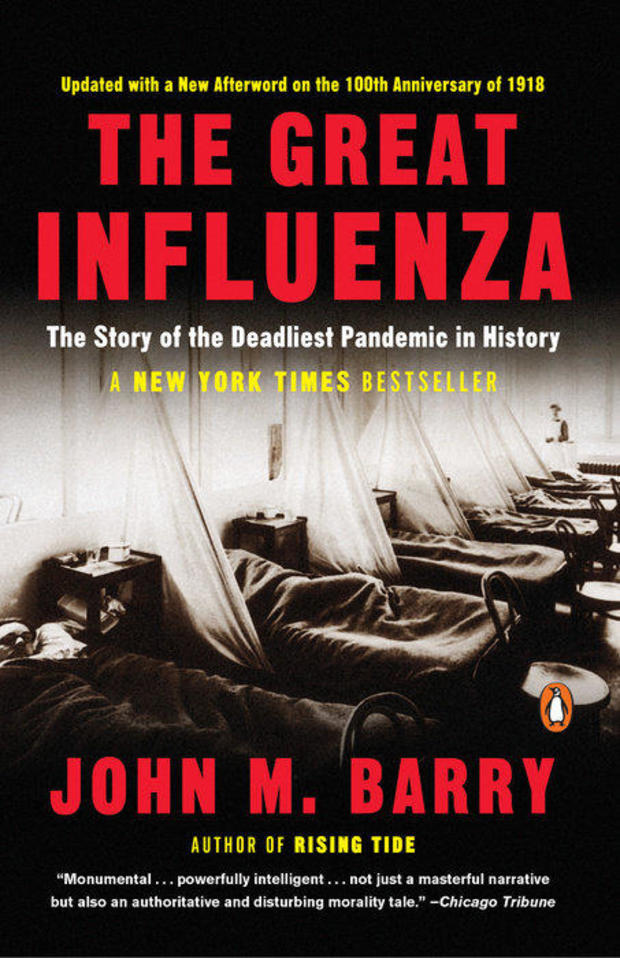Lessons from the 1918 Spanish Flu epidemic - CBS News
Look at the dates: 1890-1918; 1878-1918; 1896-1918; 1917-1918 ... Every person buried on this snowy slope in Barre, Vt, died within days, weeks of each other. "It's pretty humbling," said Brian Zecchinelli.
Nearly 200 died that Fall during that other pandemic, the 1918 so-called Spanish Flu.
Zecchinelli and his wife, Karen, own the nearby Wayside Restaurant now. It's become a Vermont institution. "Effie Ballou opened the Wayside in July of 1918, and two months later the pandemic hits Barre," he said.
Zecchinelli has never stopped thinking about how little he knew about the 1918 flu – and the fact that the grandfather he never met was one of its victims. He died at 35, on October 10 of that terrible year. Germinio Zecchinelli, like so many other Italian stone cutters, had moved to Barre to quarry granite, to carve the nation's gravestones (and often each others', as it turned out).
"The Spanish Flu is often referred to as the 'forgotten flu,'" Zecchinelli told correspondent Martha Teichner. "And if we had anything to do with it, it wasn't gonna be forgotten, Germinio and all the others. We wanted to do something to memorialize him and the 50 million others worldwide that died."
Because, to his astonishment, there was no substantial monument – anywhere – in spite of the staggering number of dead. The forgotten pandemic, indeed.
So, in 2018, a century after the fact, Zecchinelli commissioned this one. "It is unbelievable that nothing else had been done," he said."
Six-hundred-seventy-five thousand Americans died in that pandemic. We're at nearly a million and counting dead from COVID.
Has history taught us anything?
Tulane University scholar John Barry, who wrote the definitive history of the 1918 flu, "The Great Influenza," said, "This time around it confirmed the lesson from 1918: you tell the truth.
"You heard things like - this is all about the 1918 virus - 'This is ordinary influenza by another name,' which of course, it wasn't. It's crystal clear that Trump himself knowingly said things that weren't true" (such as his February 27, 2020 statement: "It's going to disappear. One day it's like a miracle, it will disappear").
And what did confusion over the constantly-evolving science do to trust and compliance? (Dr. Anthony Fauci's March 8, 2020 statement, "There's no reason to be walking around with a mask," vs. Fauci's Oct. 29, 2020 support for community COVID protocols, "the flagship of which is wearing a mask.")
"You know, trust, truth, they're all interconnected," Barry said.
Teichner asked, "Was the result the same then and now?"
"Well, clearly people who might otherwise have been alive, died in 1918," he replied. "And clearly this time around, people didn't believe the truth when they were told the truth. The misinformation, the active attacks on vaccines, there's no question it's killed people."
Martha Lincoln, a medical anthropologist at San Francisco State University, sees 1918 amnesia happening again. "We're already forgetting, even before the pandemic is over. We're already forgetting the pandemic. I foresee, at best, a long struggle about whether we will remember, really, at all, and if we remember, what that memory will be."
For example, our entertainment, Lincoln said, is like some parallel universe where COVID is invisible, or long gone.
Not everyone is choosing to forget. In Barre, Vt, the self-proclaimed granite center of the world, the monument business is booming. "We're up 25-30% depending on product lines; I think all domestic manufacturers are up," said Rob Boulanger, who manages the huge Rock of Ages plant. "People are pre-buying, so people are looking at their mortality, right? And wanting to take care of those final arrangements before something happens."
Teichner asked, "Has COVID influenced that?"
"Oh, absolutely."
The longing to remember – and be remembered – a catalyst.
"I think that if we don't manage to properly memorialize those that have been lost in this pandemic, it says that people like my dad, his life, didn't matter," said Kristin Urquiza. She never got to say goodbye to her father, Mark Urquiza, who died on June 30, 2020, isolated, on a ventilator, in an Arizona hospital. It was pre-vaccine. Cases were rising, but Arizona had opened back up.
"Sure, maybe he should have said no to coming together with his friends to celebrate the 'end' of the pandemic," Urquiza said. "He was given false information upon which he made choices, and that cost him his life."
Urquiza founded a non-profit, Marked by COVID, advocating for permanent memorials and a CVOD Memorial Day. In Congress there's been limited support. She said, "Our elected officials would much rather move on, and I'm here to say we're not going to let you."
Barry said, "I wouldn't be surprised if there weren't really many memorials."
"But a million dead? Are they invisible?" Teichner asked.
"Well, which party is gonna take credit for that, you know?" he laughed. "There's been an effort to create a COVID commission, like the 9/11 commission, which, unfortunately, nobody seems eager to accept."
For Barry, the 1918 flu should be justification enough – proof of the cost in human lives of forgetting.
"There will be another pandemic," he said. "If we allow the lessons that could be learned from this not to be learned, then we are really fools."
See also:
For more info:
- John Barry, School of Public Health and Tropical Medicine, Tulane University
- "The Great Influenza: The Story of the Deadliest Pandemic in History" by John M. Barry (Penguin), in Trade Paperback, Large Print, eBook and Audio formats, available via Amazon and Indiebound
- Martha Lincoln, Department of Anthropology, San Francisco State University
- The Wayside Restaurant, Bakery & Creamery, Montpelier, Vt.
- Rock of Ages, East Barre, Vt.
- Marked by COVID
Story produced by Dustin Stephens. Editor: Mike Levine.




Comments
Post a Comment